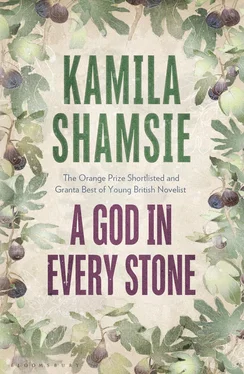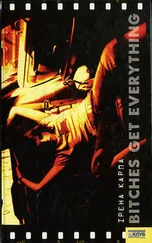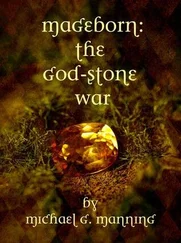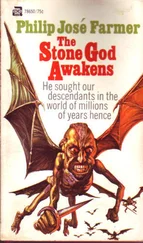The brothers faced each other on the roof; one tense and watchful, the other encouraging, slightly impatient.
— Ready?
— No, wait. One second.
Yesterday, a staccato sound on the roof had made Qayyum drop his cup of tea; when it had gone on long enough to sound more like hail than bullets he had come up to the roof to investigate, and found Najeeb holding one hand in front of his right eye while bouncing the ball with the other hand. He had bounced the ball more than fifty times in a row without fault before he realised he was being watched by Qayyum who spent his days repeating this very action, without anything of Najeeb’s fluidity. Qayyum winced to think that all these days while he thought he was engaged in a private act his family below had been able to hear the aching gaps between every few bounces. Tomorrow we’ll play catch, Qayyum had said and turned away.
— Now.
Najeeb threw the ball. It travelled in a slow, chest-high loop, beginning a downward path well before it reached Qayyum so that his hands were only waist-high as he caught it.
— Well done! Najeeb called out.
Qayyum looked up slowly from the cupped hands holding the child’s toy.
— This is ‘well done’ in my life now.
He saw Najeeb turn his face away to the white sky of summer and knew his brother was wishing he were somewhere else.
— I’m sorry, Qayyum said. Najeeb shook his head but didn’t look up. Qayyum wasn’t sure if he was rejecting the apology or pretending there was no need for it.
— I’m more sick of me than you are.
— I’m not sick of you.
— Do you think I haven’t noticed you go away after lunch and don’t come back until long after the lessons with the maulvi are supposed to end?
— It’s not because I’m sick of you.
— No, don’t apologise. It makes me happy to think of you reading in Shalimar Bagh beside a fountain. There was an officer at Vipers — he carried a book in his pocket and in these minutes we were gathered on the slope, waiting for the order to attack, I saw him lie on his stomach, put his head in the book and go somewhere else. I envied him, and then I was happy because I knew my brother also had that in him. Whatever happens in the world, Najeeb can escape.
Qayyum launched the ball back towards his brother. Najeeb fumbled for it — it was obvious he only did that because he thought it a kindness.
— Lala, there’s something I want to know. About when you were over there.
— Ask me anything. But don’t ask me what happened on the battlefield.
He felt a slight constriction of the mouth as he spoke, as though loose stitches were looped between his lips. Najeeb stepped towards him, right hand raised, palm outwards; a formal gesture that came from outside Qayyum’s world.
— Tell me about the Englishwoman who gave you the handkerchief. Was she nice? Did you practise English with her?
— Listen, Najeeb. Don’t become curious about Englishwomen.
— I’m not asking it in a bad way.
— The English, they don’t think there are any good ways for an Indian to want to know things about their women. Maybe they’re right. Would you want Englishmen to come here and ask about our sisters?
— What would they ask?
— Are they nice? Can I practise Hindko with them?
The idea of an Englishman wanting to practise Hindko with any of their sisters was so absurd Najeeb started to laugh. His arm slung back to throw the ball to Qayyum, as though they were in a time before. Arrow-straight, it gathered speed, making for Qayyum’s face, his eye. Najeeb shouted out a warning, but his brother’s hands came up to catch it with the old deftness, the sound of palms closing around a speeding ball sweeter than all the sitars in the world.
Finally there came the morning when all signs of the infection had dissipated. Qayyum placed the glass eye into his socket, and stood for a long time looking in the mirror. Almost himself, but when a man’s gaze on the world changes everything shifts with it. He hoisted his knapsack with the soldiers’ mementoes onto his shoulders, put on his sturdiest shoes, and went downstairs.
His mother looked up from the peas she was shelling at the dining table, and her face was unknown to him. The colour came and went from it, and she lifted two fistfuls of pea pods from the pan and threw them up into the air as though they were rose petals at a wedding, her voice a cry of delight. Najeeb had been on the way out, schoolbag in hand, but he walked back into the room and embraced his mother around the shoulders.
— Amma, it’s a glass eye.
Qayyum silently picked the pea pods off the floor and table and returned them to the pan, slipping his hand away from his mother’s when she tried to clasp it.
Away from the noise and chaos of the city he was received in villages and small towns as the fulfilment of a dream: a Pashtun soldier returned from war. Everywhere he went he was asked to stay a night and a banquet was prepared in his honour, even when it meant slaughtering the chicken which the family relied on for eggs; the object he brought with him — pebble or bullet or photograph — was passed from hand to hand as if it were a piece of the Black Stone brought by the angel Jibreel himself. On foot he travelled through the Valley’s orchards, crossed its rushing streams at their narrowest point. One day, bathing his face in the water, he felt himself rinsing Europe from his eyes. How had he thought the beauty of France superior to this — he opened his arms wide to the rivers bounding down foothills, racing each other to the Valley — this jewelled earth.
His last stop before he returned to Peshawar was Shahbaz Garhi in the Yusufzai lands, home of his forefathers. The brothers of Sepoy Khuda Buksh took the letter and the red feather from the throat of a bird which he had brought for them and told him that the man who had sent these tokens was dead; someone from the Army came to see them the previous week to deliver the news. So now you are our brother in his place, they said, as if relaying a fact rather than conveying an honour, and allowed him to enter the zenana where the older women kept their tear-streaked faces uncovered while they pressed him for news of the boy who only Qayyum had seen as a man. When it was time to leave one of the old men of the family took him by the elbow:
— There’s something you should see, Yusufzai scribe.
His new brothers took him to a giant rock with shapes cut into it. Kneeling, the youngest of them used the end of his turban to wipe away dust from a small section. Faded symbols made up lines which sloped and slanted towards each other like weary battalions. Even before there was paper there were scribes amongst the Yusufzai, the old man said. But what does it say, Qayyum asked. The old man didn’t know exactly but they were the words of the King, Asoka, who ruled with blood and fire until one day on a battlefield he looked at the mountain of the dead, heard the sobbing of a woman whose husband and sons had all been killed, and became a follower of the Buddha, renouncing violence and inscribing stones with his belief in peace.
His fingers lightly brushing the ancient words, Qayyum saw Asoka walking through that field at Vipers and saying to himself, No more.
There was a small hole in the canvas draped over the branches, and when the sun was directly overhead a narrow shaft of light fell into the inkhorn. Qayyum closed his fist around the buffalo horn — it was warm, heat radiating from the ink contained within.
A few days earlier his father had taken to bed with a fever and Qayyum’s mother looked at her son in a way that reminded him that he had obligations beyond those of a postman. So now here he was, beneath a tree, legs squeezed under the table with the built-in inkhorn — his father’s pride. As a child he’d disliked the smell of ink, associating it with the boredom of standing behind his father with a fan on hot afternoons, waving a breeze onto his neck while being careful to keep the fan from smearing the ink on the page. And the letters that were dictated were inevitably dull — someone needed money, someone was sending money, someone had arrived, someone was leaving, someone was married, someone had a child, someone was dead. Everyone was well, everyone missed someone, someone missed everyone, the chicken had stopped laying eggs, where were the bolts of silk? Occasionally news of a blood feud or murder enlivened things, but not often. He’d always known he’d choose a different life for himself — he had grown up in the shadow of a fort; how could he stay immune to the soldiers parading on maidans, boots and buttons gleaming?
Читать дальше












